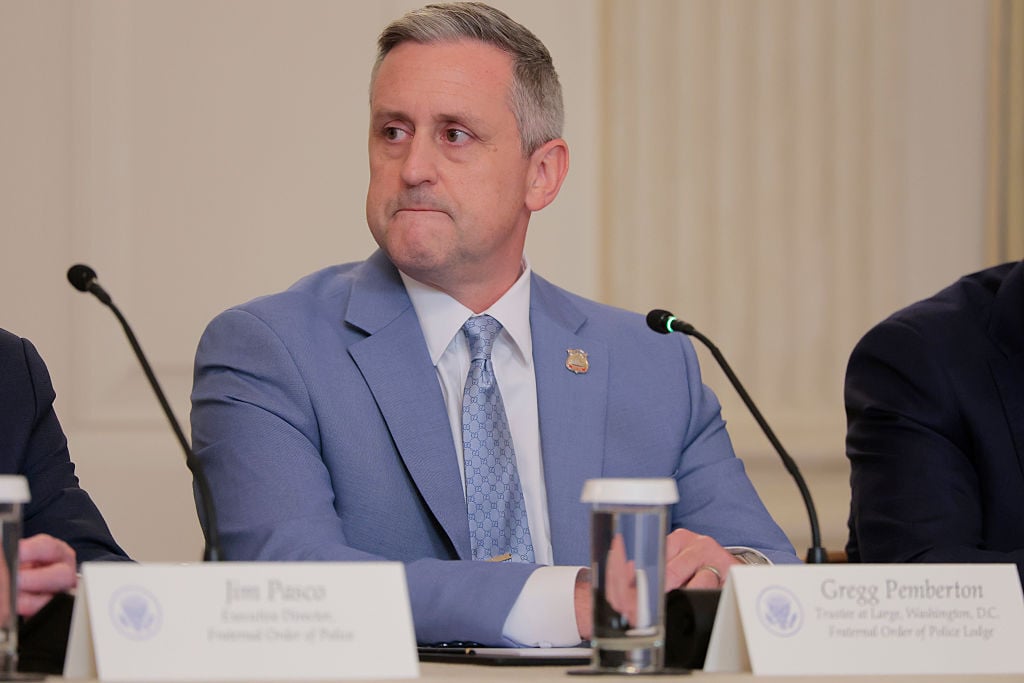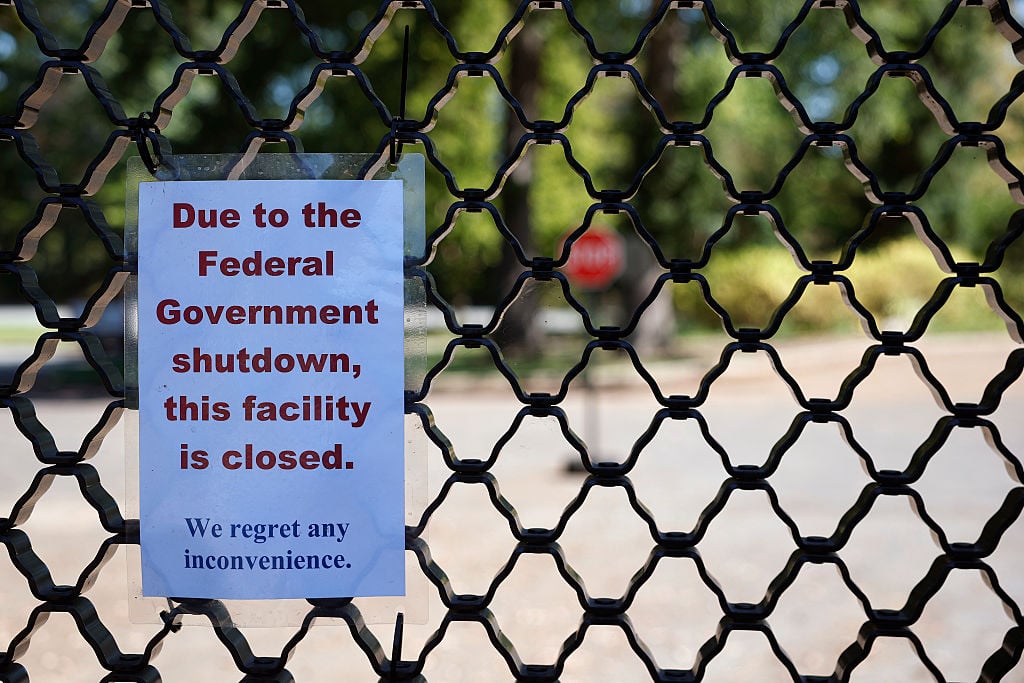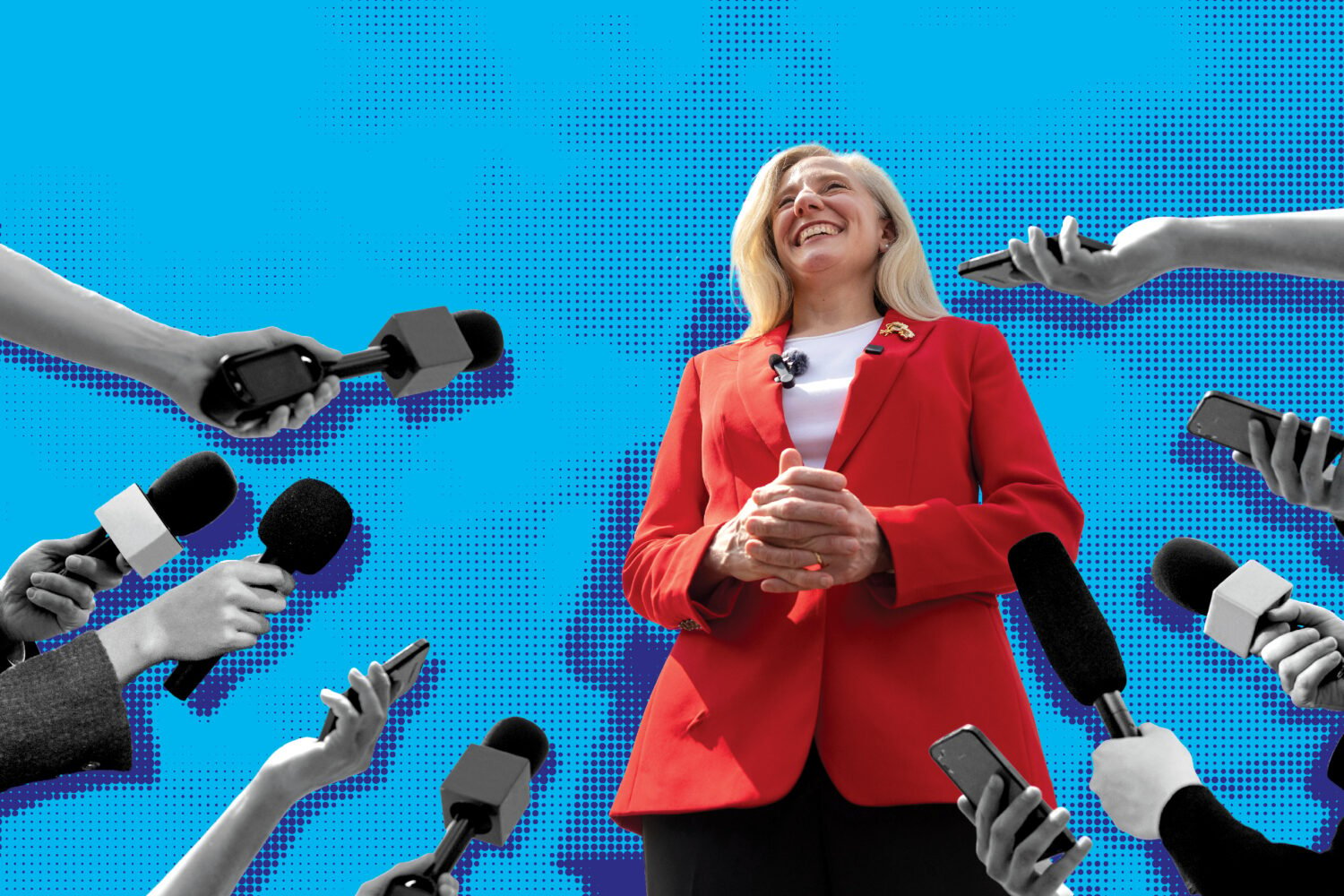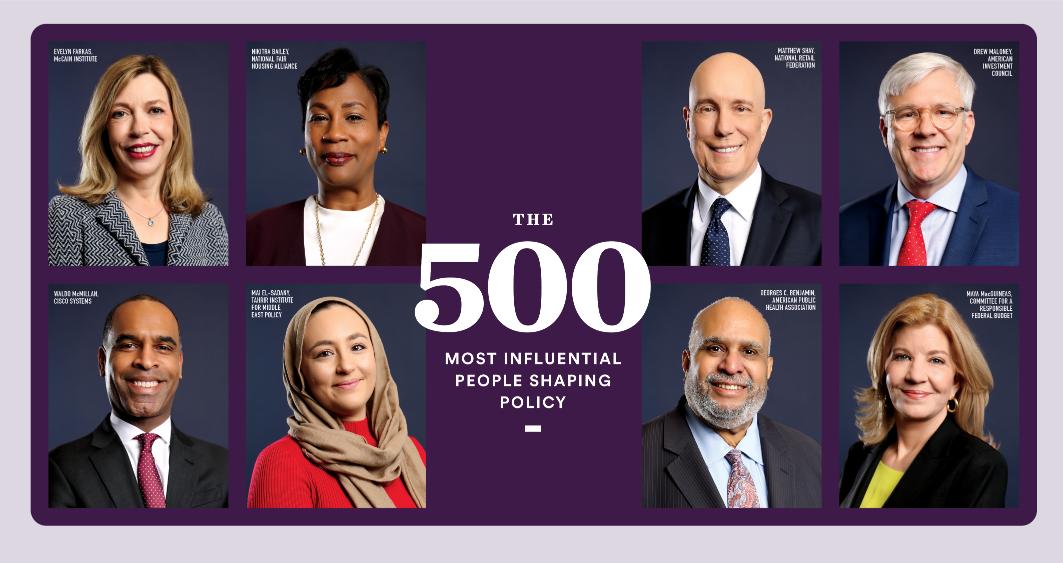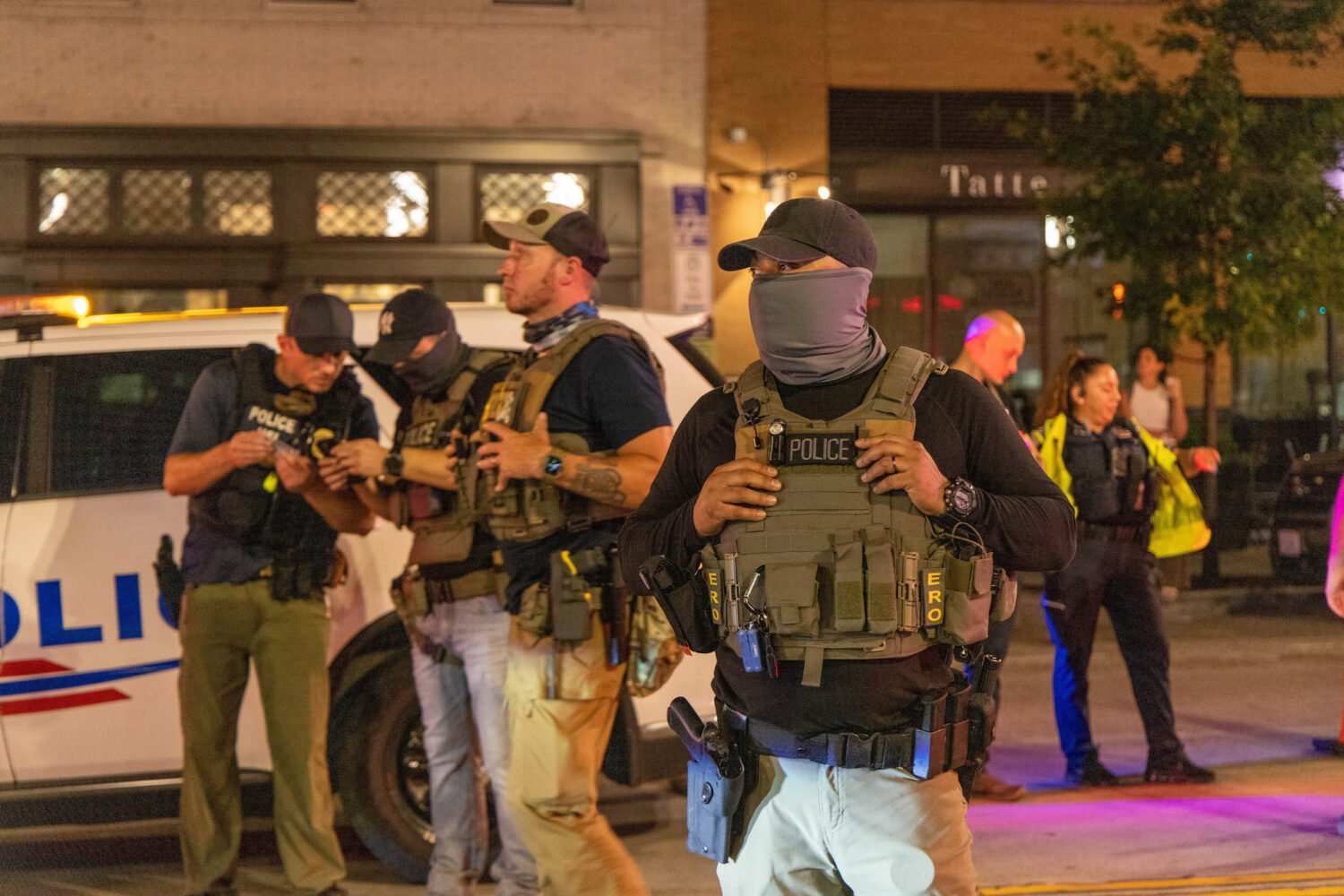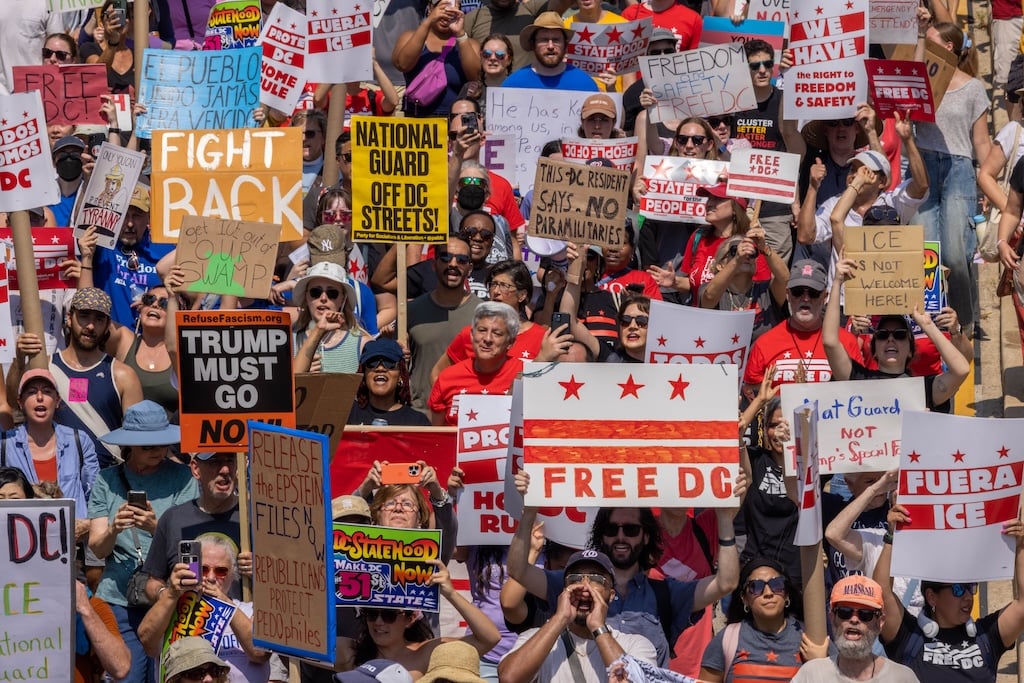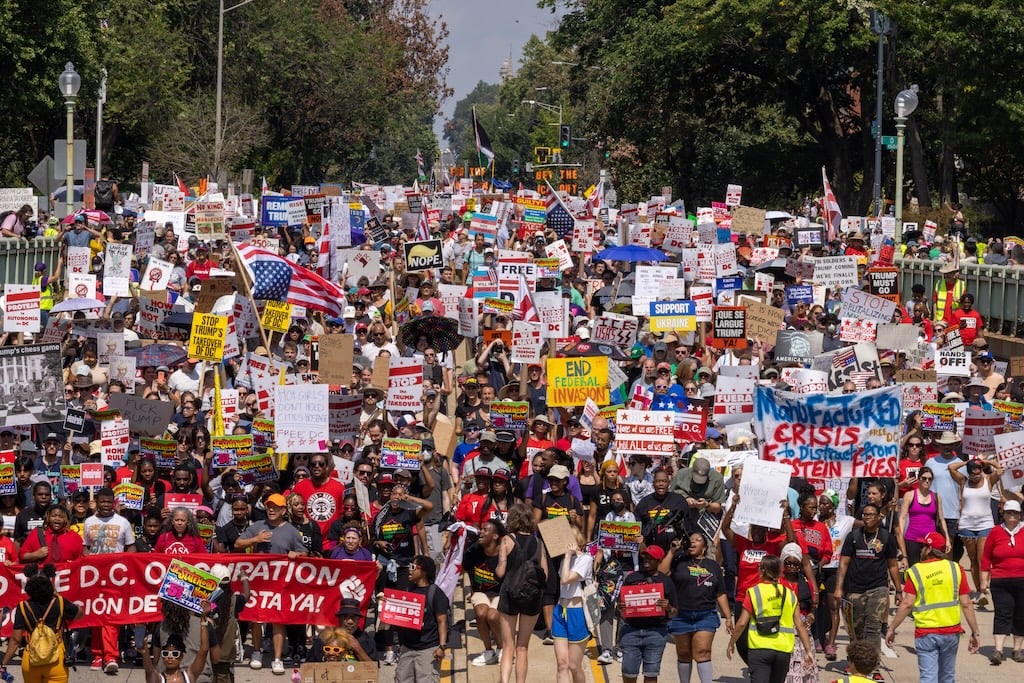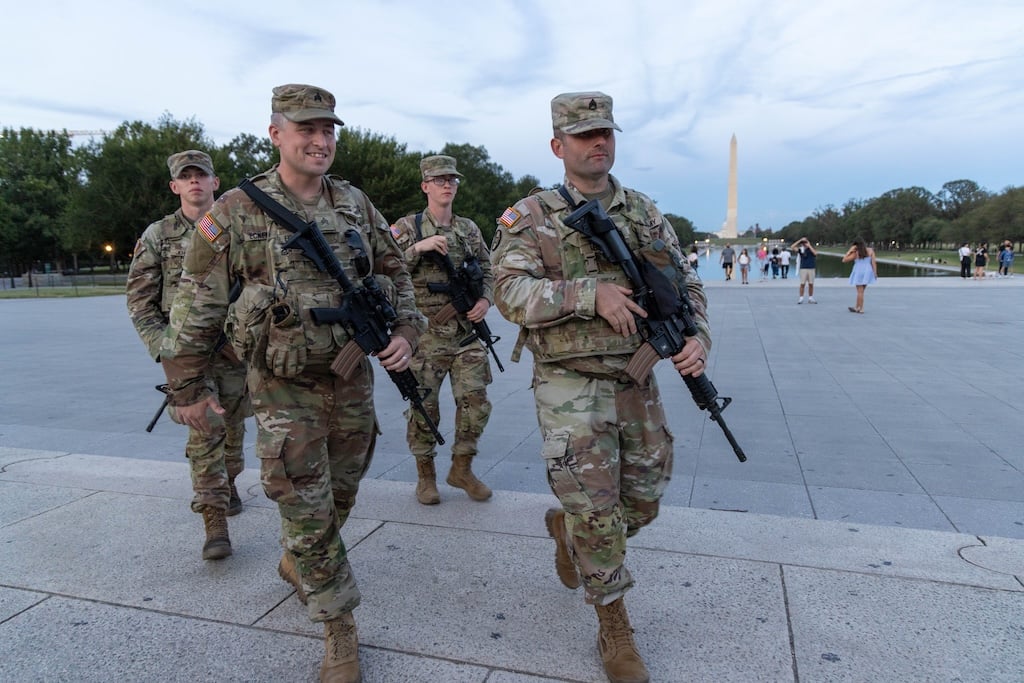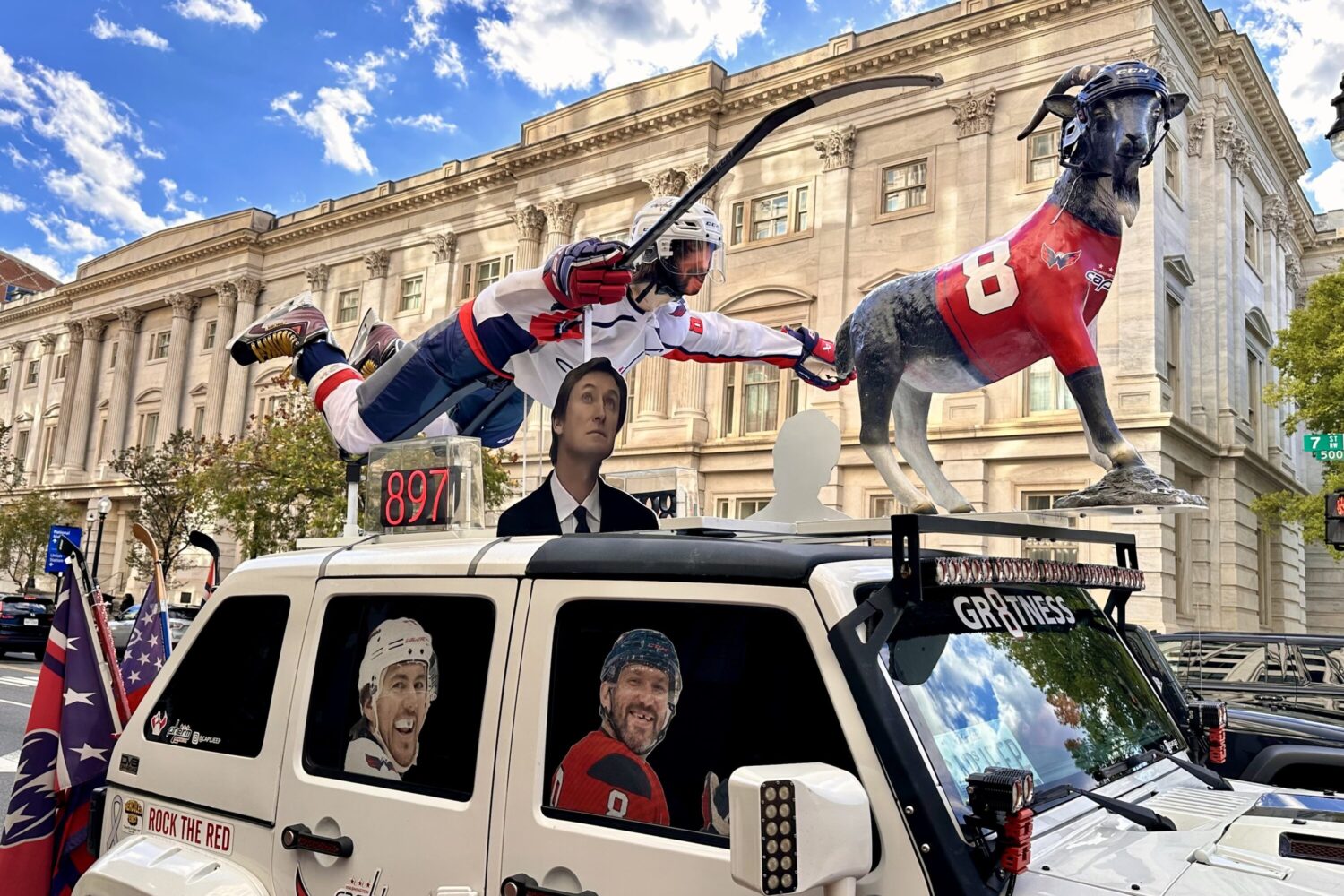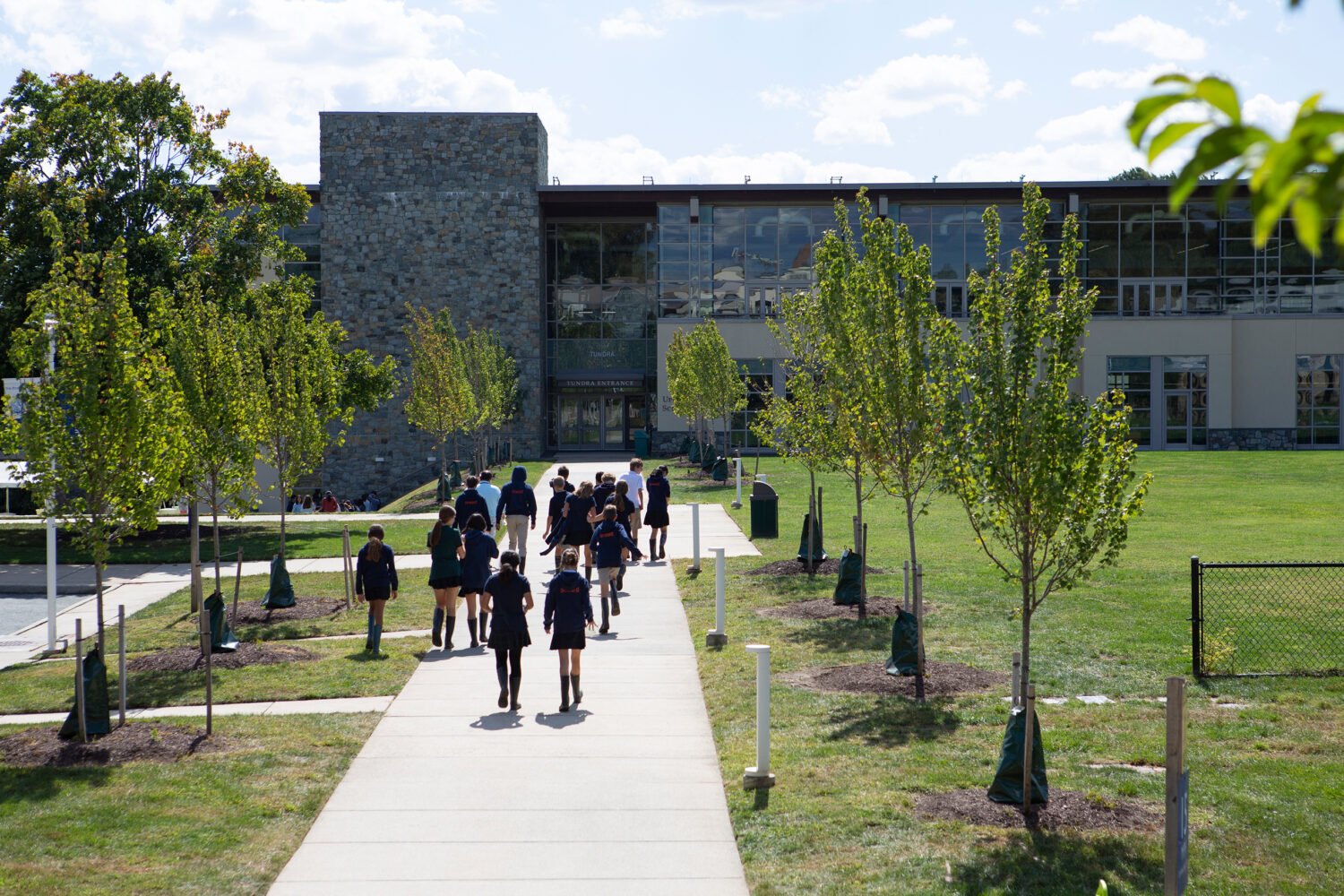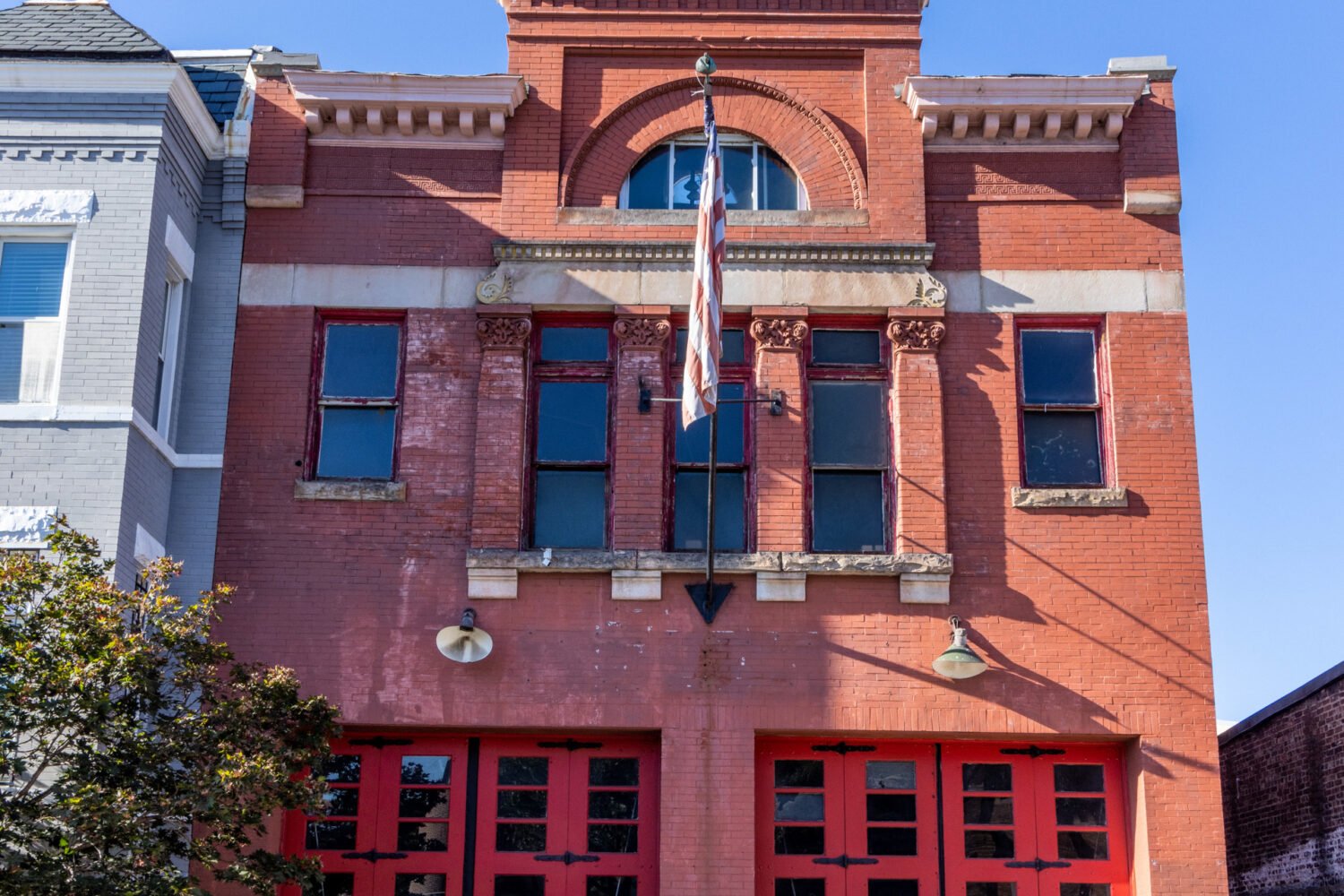Soon after he ordered a federal takeover of DC’s police department, President Trump announced a Department of Justice inquiry into whether police higher-ups had manipulated data to give the false impression that crime declined this year. The announcement coincided with one of DC Police Union chair Gregg Pemberton’s Fox News appearances.
In the segment, Pemberton—who had also called the takeover a “critical stopgap” to address crime, and said the union “stand[s] with President Trump” on it—applauded the DOJ inquiry. Many of his members, he said, had been told by captains and commanders to downgrade their reports to less serious crimes, like theft instead of robbery. “The only explanation can be to keep the crime stats down,” he said, “because politically that’s expedient for the police department and elected officials in the District.”
With footage of crime scene tape and bullet holes in walls on a loop next to his talking head, Pemberton smoothly brought up legislation passed by the DC Council as the chief culprit for the city’s predicament. Host Martha McCallum shook her head in a show of disbelief. “What you’re saying obviously substantiates what we heard from President Trump,” she said. “This sounds like a huge scandal, from what I can tell.”
It was just the kind of appearance Pemberton, a police detective who is without doubt the most outspoken pro-takeover figure in the District’s employ, is expert at. His voice lends legitimacy to Trump’s outlandish claims about out-of-control crime and mayhem in the city.
In an interview with Washingtonian, Pemberton said his personal politics don’t play a role in his work as union chairman, but that getting involved in politics is an effective negotiating strategy.
“The messaging out of the Trump White House can be at times hyperbolic, and obviously he does that with an intention to bring eyeballs onto the issue,” Pemberton tells Washingtonian. “Based on the people I’ve spoken with in the White House, I think there’s a genuine desire to both bring down crime in the District and fix the police department. Those are the top objectives of the union.”
Pemberton talks about “ubiquitous crime” on Fox News with right-wing pundit Laura Ingraham. (He’s also in a relationship with Fox 5 anchor Marina Marraco, though the two are not public about the specifics of it.) He spars with DC’s elected officials on social media—this week, he reposted a police union tweet that said council member Charles Allen “loves criminals more than law abiding citizens”—and directly lobbies GOP lawmakers like Kentucky representative James Comer, the House Oversight Committee chair, Georgia Representative Andrew Clyde, and Long Island Representative Andrew Garbarino about DC’s law enforcement policies.
DC political operative Chuck Thies, who has previously advised the police union in relations with the council, says that for better or worse, Pemberton is filling a void in public appearances by Metropolitan Police Department, or MPD, chief Pamela Smith, who has made almost no public statements about the federal takeover.
“The chief of police is MIA, so Gregg is the voice of the MPD until they find someone who they want to put in front of the cameras,” he says. “Right now, if you’re not in front of the cameras every day, you’re losing this argument, because the messaging is all coming out of the White House and is being amplified by Pemberton—or the messaging is coming from Pemberton, and being amplified by the White House.”
The DOJ and House Oversight Committee may find credible evidence that DC’s police department has underreported stats—this isn’t the first time the accusation has been made. But like Pemberton’s support for the federal takeover, his statements on crime stats stick closely to MAGA policy toward DC, often throwing local politicians under the bus.
“There’s no question in my mind that the Department of Justice inquiry into the veracity of MPD statistics has its basis in the police union,” DC Council Chairman Phil Mendelson says. (Pemberton supports the inquiry but says it originated with a whistleblower, not him). Mendelson calls the union celebrating Trump’s takeover “just despicable.”
For Pemberton’s political opponents, the union chair’s zealous partisanship overlooks the president’s pardoning of January 6 rioters who injured MPD officers.
Michael Fanone, the 20-year DC police veteran who was bludgeoned, tasered, and threatened with his own gun by rioters on January 6, says he got no support from the union or Pemberton afterward. “I never got so much as a f—ing phone call from this guy,” Fanone says. (Pemberton says he did speak to Fanone after the 6th, but cut off communications after Fanone recorded and shared a union meeting with a reporter.)
The DC Police Union’s fingerprints were on another recent White House pronouncement, too. The union had been seeking a pardon for officers Terence Sutton, who was convicted of second-degree murder and obstruction of justice, and Andrew Zabavsky, who was convicted of obstruction of justice, for their role in the murder of Karon Hylton-Brown in an unauthorized pursuit in 2020. Shortly after being inaugurated, Trump pardoned the officers and they were reinstated by the department.
“I hear from a lot of officers that feel offended because he devalues the work they’re doing,” says Allen. “It might work for him to get a meeting with Stephen Miller or Donald Trump, but it leaves a lot of his officers out in the cold.”
Originally from Chicago, where some of his friends were cops, Pemberton joined the DC police in 2005, and became a detective three years later. He was the lead detective on a group of cases involving protestors at Trump’s inauguration in 2017 that led to felony rioting charges. According to a complaint filed last year by DC’s Office of Disciplinary Council, he and prosecutor Jennifer Muyskens knowingly presented as evidence footage shot secretly by the far-right group Project Veritas, which had infiltrated a group of protestors. Ultimately, the cases against the protestors fell apart.
Pemberton ran for union chair in early 2020, hoping to win better raises for officers and better enforcement of contracts. Shortly after he won the election, the DC Council passed its Comprehensive Policing and Justice Reform Emergency Amendment Act, which banned neck restraints, made body camera footage more accessible, eliminated the union’s ability to negotiate over discipline, and raised the standard for use of force.
Pemberton and the union fought hard against the law, which he began to see as a “black cloud” that was solely responsible for the subsequent shrinking of the force. The way he saw it, the new restrictions led to a perception among officers that they were “not allowed to do their jobs,” and negative word-of-mouth made prospective cops reconsider joining the MPD.
Pemberton says he began lobbying GOP members of Congress to block the bill only as a last resort after failing to make headway with the council.
“All of the chairmen who have come before me have said the same thing: ‘don’t go to the Hill under any circumstances, because then you’ll be treated as a pariah with the council,’ ” Pemberton says. “But we had to make the decision, because the council wasn’t going to listen to us; they weren’t going to fix it.”
When House Oversight Committee Republicans held a hearing on the DC crime spike in 2023, Mendelson and Allen defended their policies and quoted statistics in an attempt to contextualize what they acknowledged were real public safety concerns. Meanwhile, Pemberton went on the attack in his testimony, blaming the council’s “virulent attacks on police officers” for a city “under siege” by crime. He electrified House Republicans.
“I’m sure there were meetings prior, but that was the moment that solidified who he is in the eyes of Congress,” says Patrick Mara, the chairman of the DC Republican Party. “After that hearing, I think there was a very abrupt realization that the council was the problem, and that this guy who’s a detective is trying to stand up to the DC Council.”
“I’m saying the same thing I’ve been saying for five years, since June of 2020,” Pemberton says. “I’m looking for anyone that’s willing to help us scuttle [the police reform bill]. If that had been Democrats, I’d be talking to them.”
In no small part, Pemberton’s efforts have led to the DC Council—in contrast to Mayor Muriel Bowser—becoming a major target for conservatives. The union’s official X account frequently attacks Mendelson and Allen, often drawing cheers from the online right.
In July, when Mendelson called the police to his house to respond to a protest outside, the response was apparently slow. “Because of the delay, [Mendelson] called and screamed at the OUC and MPD staff,” the DC Police Union tweeted. “There is now a permanent security detail at his home staffed by an MPD officer who should be handling more important matters. We currently have 3,100 total sworn members, the lowest in 50 years, and we now have to dedicate one of them to be a security blanket for a man who hates cops, while other people calling 911 for real emergencies will have to wait.”
Mendelson tells Washingtonian he didn’t scream, that the detail was not permanent, and that he does not hate police.
“Pemberton has been very harmful to the police department and its ability to hire police officers, and I think he’s been harmful to the relationship of the District of Columbia to Congress,” the chairman told Washingtonian last week. “If he was not the union president, I would say he should be fired.”
Pemberton acknowledges that he’s taken a belligerent approach, but he considers it part of negotiating for better work conditions as a public sector union boss, which involves putting pressure on elected officials.
“We’re throwing elbows, it’s definitely an aggressive posture,” he says. “The fact is that the city council is the reason that we’re here.”
The union also advised officers not to cooperate with one of DC Auditor Kathy Patterson’s audits after a 2022 report on the force, which found that three dozen officers fired for misconduct had been reinstated through collective bargaining and received $14 million in backpay from DC. The union’s lawyers sued Patterson’s office, claiming the release of the information violated personnel rules; the case is still pending.
“[Patterson’s] motive is to make sure she destroys the police department,” Pemberton says.
Patterson told Washingtonian her recommendations as auditor—including more use of data and supervision of overtime—are meant to improve, not destroy, what she calls “one of the strongest urban departments in the country.”
“In my working relationship with the police union over the last 25 years, I have not seen this level of political engagement at the federal level that we’ve seen with Mr. Pemberton,” says Patterson, who is also a former council member. “They’ve been very aggressive.”
Police unions across the country habitually advocate for more cops, higher spending on law enforcement, and weaker independent oversight. In doing so, they often make bold claims about rampant crime and the need for stricter laws. But Pemberton is particularly vocal.
In a Washington Post op-ed last week, Pemberton blamed council-led police reforms for the Trump takeover, describing the council as a nationwide outlier in embracing “reactionary anti-police thinking.”
“[P]ersonnel who remain on the job are treated like pariahs, not public servants,” Pemberton writes. “A once-proud profession has become a daily grind.”
Attrition from the DC police is indeed high, and the force is smaller than it has been in decades. But some former cops feel Pemberton’s rhetoric isn’t doing much to help the officers he represents.
“Individuals like Gregg put political beliefs ahead of membership interests,” says Chris Magnus, a policing consultant who has served as both a police union chairman and a chief in several cities. “At some point, Donald Trump is not going to be president, and then what happens? Your membership is going to suffer.”
Fanone, who was on the force from 2001 to 2021, feels regular cops are probably split about Trump’s takeover. Some are happy to have extra overtime and those who chafed at the council’s reforms may feel vindicated by the president’s rhetoric. Others think the takeover is a travesty.
Participation in the union doesn’t mean much to the majority of DC cops, Fanone contends, and he says Pemberton was elected with just a few hundred votes. “He really doesn’t speak for the majority of the police officers in the District,” Fanone says. (Pemberton says that something like half of union members vote in elections; results are not public.)
More to the point, Fanone says, Pemberton’s MAGA commentary undermines the crucial relationship between DC officers and the overwhelmingly anti-Trump city they police.
“You’re destroying the relationship between the police department and the community, and now you’re universally hated by the people of the District of Columbia,” Fanone says. “I’ve been out here talking to people in DC who are like, ‘how could he do this? How could he celebrate us losing our say-so?’”
Note: This article has been updated since it was originally published.

